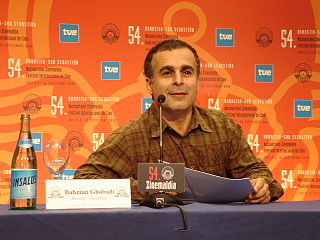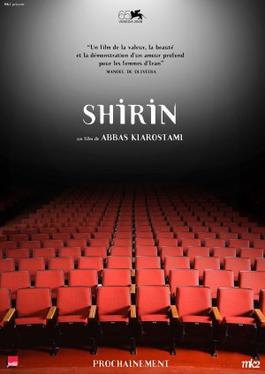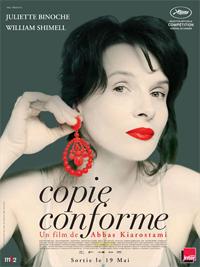
Mira Nair is an Indian-American filmmaker based in New York City. Her production company, Mirabai Films, specializes in films for international audiences on Indian society, whether in the economic, social or cultural spheres. Among her best known films are Mississippi Masala, The Namesake, the Golden Lion–winning Monsoon Wedding, and Salaam Bombay!, which received nominations for the Academy Award for Best Foreign Language Film and the BAFTA Award for Best Film Not in the English Language.

Abbas Kiarostami was an Iranian film director, screenwriter, poet, photographer, and film producer. An active filmmaker from 1970, Kiarostami had been involved in the production of over forty films, including shorts and documentaries. Kiarostami attained critical acclaim for directing the Koker trilogy (1987–1994), Close-Up (1990), The Wind Will Carry Us (1999), and Taste of Cherry (1997), which was awarded the Palme d'Or at the Cannes Film Festival that year. In later works, Certified Copy (2010) and Like Someone in Love (2012), he filmed for the first time outside Iran: in Italy and Japan, respectively. His films Where Is the Friend's Home? (1987), Close-Up, and The Wind Will Carry Us were ranked among the 100 best foreign films in a 2018 critics' poll by BBC Culture. Close-Up was also ranked one of the 50 greatest movies of all time in the famous decennial Sight & Sound poll conducted in 2012.

The cinema of Iran, or of Persia, refers to the film industry in Iran. In particular, Iranian art films have garnered international recognition. Iranian films are usually written and spoken in the Persian language.

Jafar Panâhi is an Iranian film director, screenwriter, and film editor, commonly associated with the Iranian New Wave film movement. After several years of making short films and working as an assistant director for fellow Iranian filmmaker Abbas Kiarostami, Panahi achieved international recognition with his feature film debut, The White Balloon (1995). The film won the Caméra d'Or at the 1995 Cannes Film Festival, the first major award an Iranian film won at Cannes.

Niki Karimi is an Iranian actress and filmmaker. Regarded as "the most prominent figure among the young generations coming after post-Islamic Revolution Iranian Cinema", she has received various accolades, including a Crystal Simorgh, three Hafez Awards, an Iran Cinema Celebration Award, and three Iran's Film Critics and Writers Association Awards.

Bahman Ghobadi is an Iranian Kurdish film director, producer and writer. He belongs to the "new wave" of Iranian cinema.

And Life Goes On is a 1992 Iranian film directed by Abbas Kiarostami. It was screened in the Un Certain Regard section at the 1992 Cannes Film Festival. It is considered the second film in Kiarostami's Koker trilogy.

Through the Olive Trees is a 1994 Iranian drama film written, produced, edited and directed by Iranian filmmaker Abbas Kiarostami. The final part of Kiarostami's Koker trilogy, the plot, set in earthquake-ravaged Northern Iran, revolves around the production of the second film, And Life Goes On, which itself was a revisitation of the first film, Where Is the Friend's House?.
Toothache is a 1980 Iranian short educational film written, directed and edited by Abbas Kiarostami. It is also known as Dental Hygiene which has led to some confusion and resulted in the film being listed under the latter title as an additional entry in some online filmographies, e.g. on IMDb.
Five, also known as Five Dedicated to Ozu, is a 2003 Iranian documentary film directed by Abbas Kiarostami. The film consists of five long shots, averaging about 16 minutes each. Four of the five have fixed camera positions.

Ten is a 2002 Iranian docufiction film starring Mania Akbari and Amina Maher. It was released with Abbas Kiarostami credited as the director; however, his role in the film and the source of the footage have been disputed by Akbari since 2020.
Iranian New Wave refers to a movement in Iranian cinema. It started in 1964 with Hajir Darioush's second film Serpent's Skin, which was based on D.H. Lawrence's Lady Chatterley's Lover featuring Fakhri Khorvash and Jamshid Mashayekhi. Darioush's two important early social documentaries But Problems Arose in 1965, dealing with the cultural alienation of the Iranian youth, and Face 75, a critical look at the westernization of the rural culture, which was a prizewinner at the 1965 Berlin Film Festival, also contributed significantly to the establishment of the New Wave. In 1968, after the release of Shohare Ahoo Khanoom directed by Davoud Mollapour, The Cow directed by Dariush Mehrjui followed by Masoud Kimiai's Qeysar in 1969, Nasser Taqvai's Tranquility in the Presence of Others, and immediately followed by Bahram Beyzai's Downpour, the New Wave became well established as a prominent cultural, dynamic and intellectual trend. The Iranian viewer became discriminating, encouraging the new trend to prosper and develop.
The Iranian film director Abbas Kiarostami is known for uses of certain themes and cinematic techniques that are instantly recognizable in his work, from the use of child protagonists and stories that take place in rural villages, to conversations that unfold inside cars utilizing stationary mounted cameras. He often undertook a documentary style of filmmaking within narrative works, and frequently employs contemporary Iranian poetry in dialogue, movie titles, and in the thematic elements of his pictures.

I Am Because We Are is a 2008 British-American-Malawian documentary film about AIDS orphans in Malawi. It was directed by Nathan Rissman and written, narrated, and produced by Madonna through her production company Semtex Films.

Mania Akbari is an Iranian filmmaker, artist, writer, and curator whose works explore women's rights, marriage, sexual identity, disease and body image. Her style, in contrast to the long tradition of melodrama in Iranian cinema, is rooted in the visual arts and autobiography. Because of the taboo themes frankly discussed in her films and her opposition to censorship, she is considered one of the most controversial filmmakers in Iran.

Shirin is a 2008 Iranian drama film directed by Abbas Kiarostami. The film is considered by some critics as a notable twist in the artistic career of Kiarostami.

Bahman Maghsoudlou is a film scholar, critic, author and independent film producer/director. Maghsoudlou has, in the words of Cinema Without Borders editor-in-chief Bijan Tehrani, "dedicated his life [to] recording valuable information about Iran’s contemporary art and culture."

Certified Copy is a 2010 art film written and directed by Abbas Kiarostami. Set in Tuscany, the film focuses on a British writer and a French antiques dealer, whose relationship undergoes an odd transformation over the course of a day. The film was a French-majority production, with co-producers in Italy and Belgium. The dialogue is in English, French and Italian.

24 Frames is a 2017 Iranian experimental film directed by Abbas Kiarostami. It was his final feature film before his death in July 2016. It was posthumously shown in the 70th Anniversary Events section at the 2017 Cannes Film Festival.















